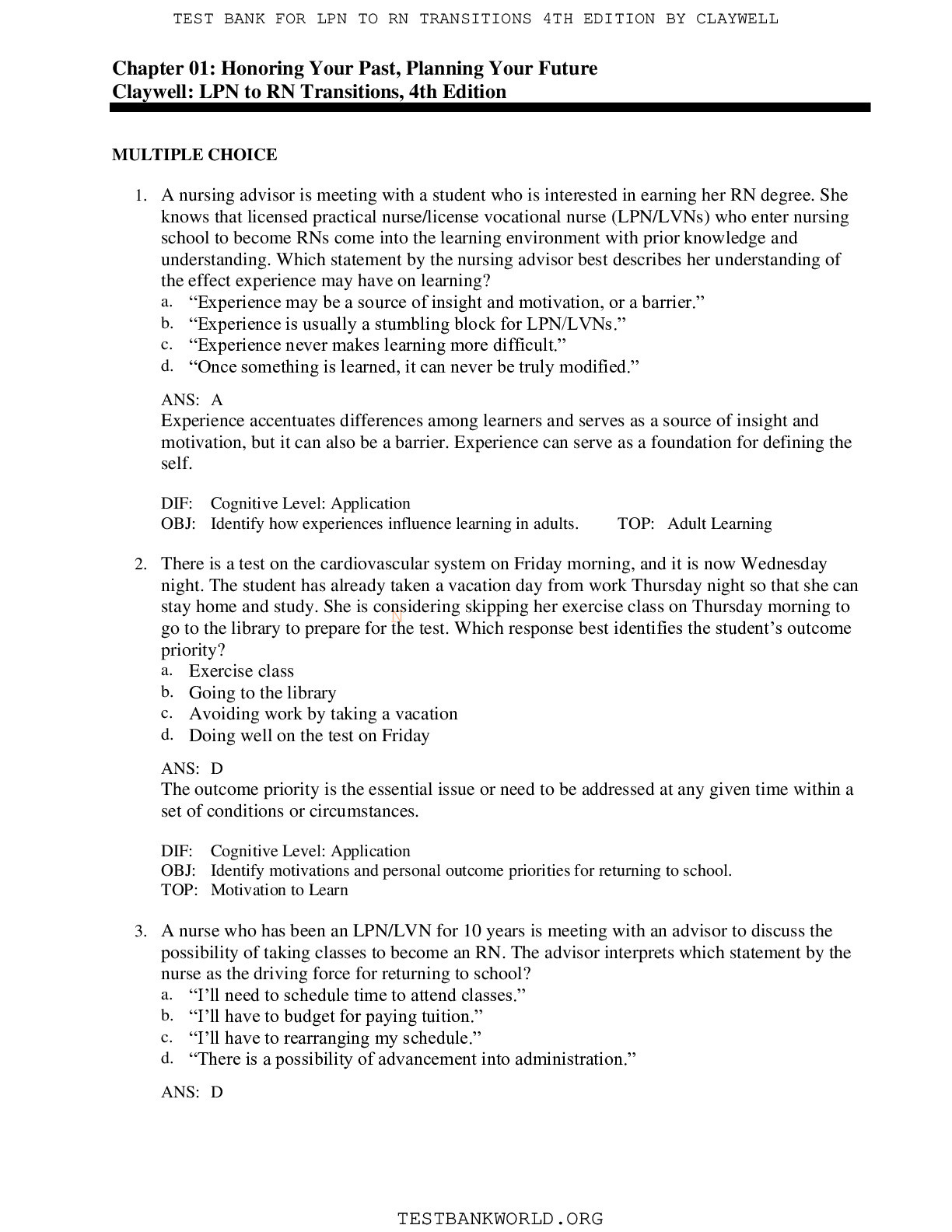All study resources > LPN to RN Transitions 4th Edition Claywell TBW Test Bank (Nursing)
LPN to RN Transitions 4th Edition Claywell TBW Test Bank
1. A nursing advisor is meeting with a student who is interested in earning her RN degree. She
knows that licensed practical nurse/license vocational nurse (LPN/LVNs) who enter nursing
school to become RNs come into the learning environment with prior knowledge and
understanding. Which statement by the nursing advisor best describes her understanding of
the effect experience may have on learni
...[Show More]
1. A nursing advisor is meeting with a student who is interested in earning her RN degree. She
knows that licensed practical nurse/license vocational nurse (LPN/LVNs) who enter nursing
school to become RNs come into the learning environment with prior knowledge and
understanding. Which statement by the nursing advisor best describes her understanding of
the effect experience may have on learning?
a. “Experience may be a source of insight and motivation, or a barrier.”
b. “Experience is usually a stumbling block for LPN/LVNs.”
c. “Experience never makes learning more difficult.”
d. “Once something is learned, it can never be truly modified.”
2. There is a test on the cardiovascular system on Friday morning, and it is now Wednesday
night. The student has already taken a vacation day from work Thursday night so that she can
stay home and study. She is considering skipping her exercise class on Thursday morning to
go to the library to prepare for the test. Which response best identifies the student’s outcome
priority?
a. Exercise class
b. Going to the library
c. Avoiding work by taking a vacation
d. Doing well on the test on Friday
3. A nurse who has been an LPN/LVN for 10 years is meeting with an advisor to discuss the
possibility of taking classes to become an RN. The advisor interprets which statement by the
nurse as the driving force for returning to school?
a. “I’ll need to schedule time to attend classes.”
b. “I’ll have to budget for paying tuition.”
c. “I’ll have to rearranging my schedule.”
d. “There is a possibility of advancement into administration.”
4. An RN is caring for a diabetic patient. The patient appears interested in changing her lifestyle
and has been asking questions about eating better. The nurse can interpret this behavior as
which stage of Lewin’s Change Theory?
a. Moving
b. Unfreezing
c. Action
d. Refreezing
5. An LPN is talking with her clinical instructor about her decision to return to school to become
an RN. The clinical instructor interprets the LPNs outcome priority based on which
statement?
a. “My family wanted me to go back to school.”
b. “I want to better my financial situation.”
c. “I really enjoy school.”
d. “I would like to advance to a teaching role someday.”
6. A nurse notices a posting for a management position for which she is qualified. If the nurse is
in the moving phase of Lewin’s Change Theory, which statement reflects the action she is
most likely to take?
a. Does nothing to obtain the position
b. Applies for the position
c. Identifies that change is needed
d. Settles into the routine of her job
7. An Orthopedic Nurse is contemplating changes in her professional life and identifying goals.
Which action should the nurse take if she is interested in pursuing a long-term goal?
a. Studies for a telemetry exam scheduled for next week
b. Enrolls in a Nurse Practitioner program
c. Attends a seminar to become a charge nurse
d. Continues to work on the orthopedic floor full-time
8. The RN is talking with the unit manager about ways to improve patient care. The manager
introduces the concept of a cohort. Which statement by the RN indicates that the teaching has
been effective?
a. “A cohort is a web of connections”.
b. “A cohort is a group of people who share common experiences with each other”.
c. “A cohort is a group linked together for common purposes”.
d. “A cohort consists of groups of individuals that make up a whole”.
9. The nurse educator is presenting a lecture to a group of new RNs. Which statement by one of
the RNs indicates that teaching has been effective?
a. “Experience is a stepping stone to new learning”.
b. “Experience can be a barrier to new learning”.
c. “Experience can be an avenue to new learning”.
d. “Experience can be a detour to new learning”.
[Show Less]
